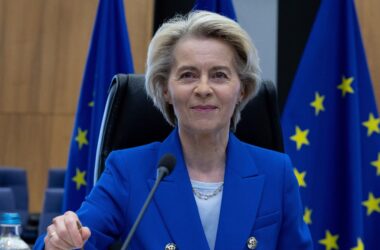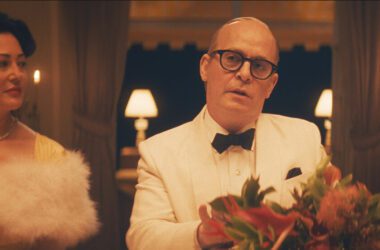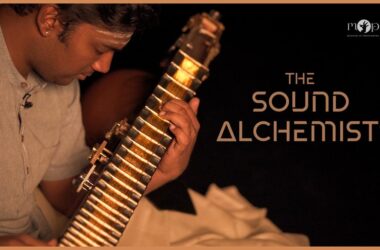[ad_1]
Norman Carol, a former violin prodigy who was first chair and concertmaster for the acclaimed Philadelphia Orchestra for nearly three decades, accompanying it on a history-making trip to China under Mao Zedong in 1973, died on April 28. He was 95.
His death, at an assisted living center in Bala Cynwyd, a community on Philadelphia’s Main Line, was announced in a statement posted on social media by the orchestra. It was not widely reported outside the classical music world at the time.
As concertmaster, tuning the orchestra and overseeing the string section, Mr. Carol served under the celebrated conductors Eugene Ormandy, Riccardo Muti and Wolfgang Sawallisch.
“He was dashing, comfortable, even swashbuckling as a leader,” Paul Arnold, a violinist with the orchestra, said in the statement. “His playing was bold, expressive and hall-filling.” Mr. Carol “went on to personally embody the ‘Philadelphia Sound,’” he added.
That fabled sound, which emerged under Leopold Stokowski and took shape under Ormandy, the orchestra’s longtime music director starting in the 1930s, is built on “distinctive honeyed timbre” emanating from its strings, as the journal Classical Voice North America noted in 2015, along with softer attacks from the brass section and a more blended percussion approach.
The orchestra’s sound became known around the world in tours of Europe and Asia during Mr. Carol’s tenure.
The groundbreaking trip to China, in which the orchestra performed in Beijing before Mao’s wife, Jiang Qing, also known as Madame Mao, came at the behest of President Richard M. Nixon as part of his efforts to re-establish ties with the country. The visit, in September 1973, was a musical analogue to the “ping pong diplomacy” of American table tennis players who visited China in 1971.
“We were the first Western orchestra to go,” Mr. Carol said in a 2013 interview with Ovation Press, a music publisher that he worked with on several compositions. “It was just at the end of the Cultural Revolution, and people were really starving for classical music.”
The orchestra, led by Ormandy, performed before packed audiences in three concerts over three nights at the Cultural Palace of Nationalities in Beijing. The orchestra agreed to perform the “Yellow River” concerto, a communally written piece that was considered an anthem of the Cultural Revolution, the decade-long effort by Mao, starting in 1966, that was intended to purify the revolutionary spirit of the country but that descended into bloody purges costing an estimated 1 million or more lives.
As for Western compositions, works by Tchaikovsky and other Russian composers were forbidden to be played because of fractures in Chinese-Russian relations at the time. Beethoven was considered acceptable because he was seen as something of a revolutionary, as James Carter, a historian of China, wrote in an article about the China visit published in 2021 by the China Project, a New York-based news site.
By special request of Madame Mao, the Philadelphia Orchestra performed Beethoven’s Sixth Symphony, known as the Pastoral Symphony, a piece that dovetailed with the agrarian ideals of the revolution.
Ormandy was not particularly fond of the symphony but relented, telling a colleague, “When in Rome, we should do as the Romans wish.”
Norman Carol was born on July 1, 1928, in Philadelphia, one of two children of Anna and Max Carol, both Russian immigrants.
He started on the violin at 6. “My older sister played violin, and in those early days there was no such thing as a babysitter, so my mother used to take me along to the lessons,” he told Ovation Press. “My sister’s violin teachers saw another ‘victim’ in me.”
By 9 he was performing his first Mozart concerto, and at 13 he began studying at the Curtis Institute of Music in Philadelphia, where he would serve on the faculty for 35 years starting in 1979.
Following graduation in 1947, Mr. Carol pursued a solo career, making his New York City debut at Town Hall in a performance covered by Time magazine.
He was drafted into the Army during the Korean War. While stationed at the Presidio base in San Francisco, he played in a military band with the jazz trumpeter and vocalist Chet Baker and the future conductor André Previn.
During that period he met his future wife, Elinor Trobbe. After they married in 1952, Mr. Carol discovered that “if you want to eat and do other things in life, solo careers aren’t always as wonderful as they look,” he said in the Ovation Press interview.
After serving as concertmaster for orchestras in New Orleans and Minneapolis, he landed with his hometown orchestra in 1966 and remained with it until 1994, when he was forced to retire at 66 because of chronic pain in an arm and shoulder.
His survivors include his daughter, Leslie; his son, Dan; six grandchildren; and three great-grandchildren.
Last year, a delegation of musicians from the Philadelphia Orchestra toured several cities in China to mark the 50th anniversary of the 1973 trip. At one point they joined their counterparts from the China National Symphony Orchestra for a concert in Beijing.
While the 1973 visit to China became part of Cold War lore, it did not mark Mr. Carol’s last trip there.
“We went again in 1993, exactly 20 years later,” he said. “Things had changed so dramatically in China. We went from seeing no automobiles on the street to streets having traffic jams.”
Source link










